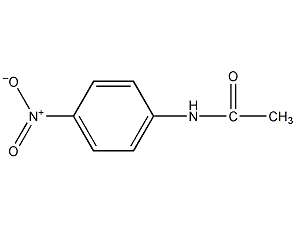p-Nitroacetanilide p-Nitroacetanilide


Structural formula
| Business number | 02PN |
|---|---|
| Molecular formula | C8H8N2O3 |
| Molecular weight | 180.16 |
| label |
4-Nitroacetanilide, p-Nitroacetanilide, p-Nitroacetylaniline, p-nitroacetamide benzene, P-Nitroacetanilide, N-Acetyl-4-nitroaniline, Labotest-bb lt00455738, 4′-Nitroacetanilide, 4-Nitroacetanilide, Acetic acid 4-nitroanilide, 1-Nitro-4-acetylaminobenzene, Acetamide, N-(4-nitrophenyl)- |
Numbering system
CAS number:104-04-1
MDL number:MFCD00007303
EINECS number:203-169-0
RTECS number:AE5075000
BRN number:2211962
PubChem ID:None
Physical property data
1. Character: White prismatic crystal
2. Density (g/mL, 20℃): Undetermined
3. Relative vapor density (g/mL, air =1): Undetermined
4. Melting point (ºC): 213-215
5. Boiling point (ºC, normal pressure): Undetermined
6 . Boiling point (ºC, 1.06×10-3kPa): 100
7. Refractive index: Undetermined
8. Flash point (ºC): Undetermined
9. Specific rotation (º): Undetermined
10. Autoignition point or ignition temperature (ºC): Undetermined
11. Vapor pressure (mmHg, 20.2ºC) : Undetermined
12. Saturated vapor pressure (kPa, ºC): Undetermined
13. Heat of combustion (KJ/mol): Undetermined
14 . Critical temperature (ºC): Undetermined
15. Critical pressure (KPa): Undetermined
16. Log value of oil-water (octanol/water) partition coefficient: Undetermined
17. Explosion upper limit (%, V/V): Undetermined
18. Explosion lower limit (%, V/V): Undetermined
19 . Solubility: Soluble in hot water, alcohol, ether, soluble in potassium hydroxide solution to turn orange, almost insoluble in cold water.
Toxicological data
Acute toxicity: rat peritoneal cavity LDLo: 500mg/kg;
Ecological data
This substance is slightly hazardous to water.
Molecular structure data
1. Molar refractive index: 47.07
2. Molar volume (cm3/mol): 134.3
3. Isotonic specific volume (90.2K): 366.4
4. Surface tension (dyne/cm) 55.3
5. Dielectric constant:
6. Dipole moment (10-24cm3):
7. Polarizability: 18.66
Compute chemical data
1. Reference value for hydrophobic parameter calculation (XlogP): None
2. Number of hydrogen bond donors: 1
3. Number of hydrogen bond acceptors: 3
4. Number of rotatable chemical bonds: 1
5. Number of tautomers: 3
6. Topological molecule polar surface area 74.9
7. Number of heavy atoms: 13
8. Surface charge: 0
9. Complexity: 204
10. Number of isotope atoms: 0
11. Determine the number of atomic stereocenters: 0
12. Uncertain number of atomic stereocenters: 0
13. Determine the number of chemical bond stereocenters: 0
14. Number of uncertain chemical bond stereocenters: 0
15. Number of covalent bond units: 1
Properties and stability
Avoid contact with oxides.
Storage method
Store in a cool, ventilated warehouse. Keep away from fire and heat sources. Keep container tightly sealed. should be kept away from oxidizer, do not store together. Equipped with the appropriate variety and quantity of fire equipment. Suitable materials should be available in the storage area to contain spills.
Synthesis method
It is obtained by nitration of acetanilide. Add 675kg of 98% sulfuric acid into the nitrification pot, stir, and add 225kg of 99% acetanilide at 20-25°C within 2-2.5 hours. After all is dissolved, cool down to 7°C and add mixed acid (made up of 63kg water, 60kg 98% sulfuric acid and 107kg 96% nitric acid) dropwise at 4-7°C for about 20 hours. After the dropwise addition is completed, dilute it in 4000L ice water and let it stand for 1 hour. Separate the waste acid in the upper layer by siphoning, filter the material in the lower layer, and wash it with water until neutral to obtain 4-nitroacetanilide. Another preparation method is to use p-nitroaniline through acetylation.
Purpose
Used as an intermediate for drugs and dyes.